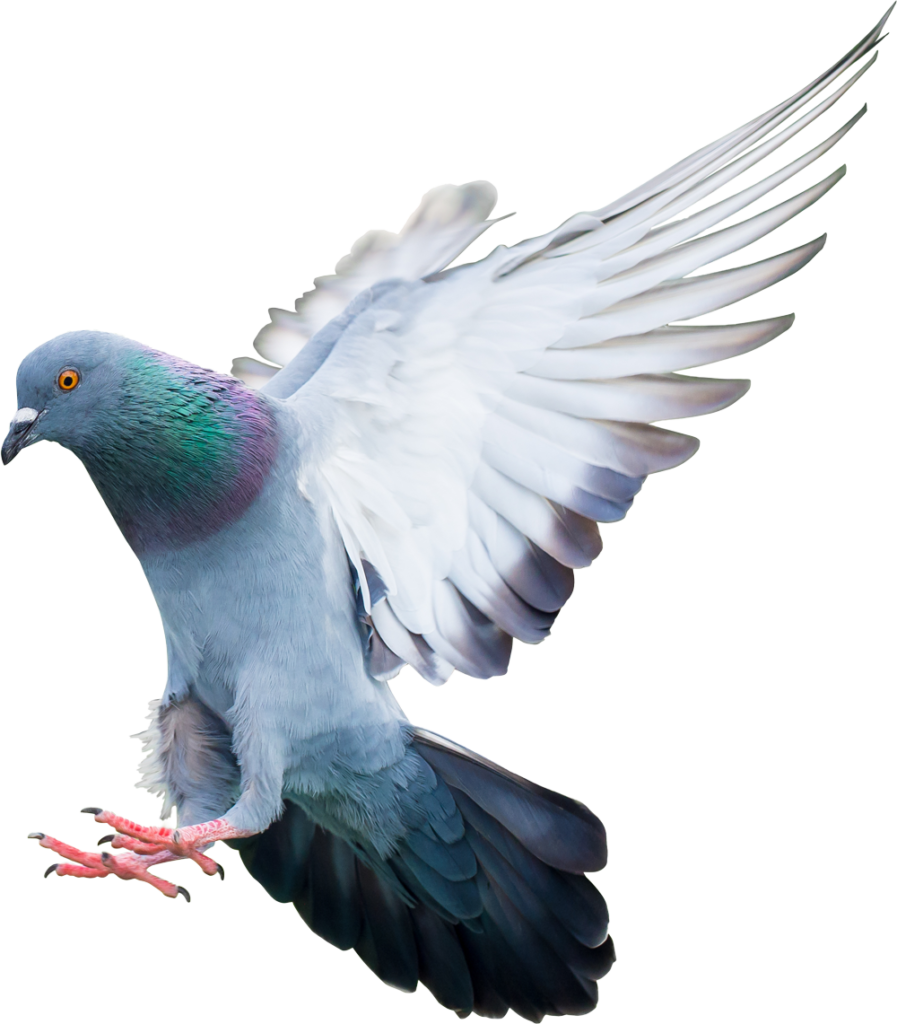Commercial Services
According to a common theory, pigeons don’t eliminate waste while in flight and can be quite selective as to where pigeons drop their mess. Some experts believe this is due to the way pigeons tuck their feet against their body while flying and defecating in this position would cause dirty feet. This is why we find clusters of pigeon droppings on the window sills, decks, statues or wherever those “flying rats” can be found hanging out.
Although seemingly harmless, pigeon feces may contain bacteria and other pathogens which can pose a serious health risk to the general public in the form of diseases such as Salmonella (bacterial infection), Psittacosis (flu like illness), Diarrhea, Histoplasmosis (respiratory disease) and more.
Large amounts of pigeon droppings can accumulate on roofs and ledges of buildings and not only look unappealing, but also pigeon droppings cause smells, attract insects and become a safety risk when any maintenance is to be completed around those areas.

Pigeon droppings pose health risks to humans due to the pathogens they carry. Cross-contamination can occur during the cleanup process, causing a variety of diseases. Even breathing in the dried particles of droppings can lead to respiratory disease if proper precautions aren’t taken. At AES, we prioritize human health and animal-friendly cleanup methods. Our certified technicians take full PPE precautions to ensure complete protection during the cleanup process. We use simple cleaning agents to approach different types of material, including wood. We take care to prevent the spread of possible contamination outside the area being cleaned. Any pests and nesting materials are removed using proper procedures, and all waste is disposed of correctly. For manual surface cleaning, disinfection, nest, and waste removal services, call us at 204-284-6390 or contact us for a free estimate.
For a free estimate!
Bird droppings can be harmful to human health and cause damage to commercial properties. Therefore, proper clean- up procedures are important to ensure the safety and health of workers and visitors, as well as to protect the property.
One of the biggest risks associated with bird droppings is the potential spread of disease. Ectoparasites of pigeons can carry diseases such as West Nile Virus, histoplasmosis, and salmonella, all of which can be dangerous to human health. In addition, dried particles of bird droppings can become airborne and easily inhaled, which can lead to respiratory issues.
When cleaning up bird droppings, it is important to approach the situation with care. For example, if the droppings are on a metal balcony, using a power washer could cause damage to the metal. Similarly, wood can be damaged by the use of harsh chemicals or excessive water.
Using clean water and a disinfectant cleaning spray is an effective method for cleaning – up bird droppings. Dead pigeons and any nesting materials should be removed using proper procedures, and all waste should be disposed of properly. Safety equipment such as gloves and masks should be worn during the clean-up process to prevent any potential health risks.
Commercial property owners should also be aware of the potential damage that bird droppings can cause to workplace machinery and roof materials. Therefore, it is important to implement bird removal procedures and regular clean up processes to avoid any costly damage.
In summary, proper clean up procedures are essential for protecting human health and commercial property from the harmful effects of bird droppings. By taking a careful and methodical approach, and using the appropriate equipment and cleaning agents, bird droppings can be safely and effectively removed.
Pigeons can be a nuisance when they gather in large numbers and leave their droppings everywhere, causing unsightly stains and odors. The best way to get rid of pigeons is to start with prevention by blocking their entry points and removing any food sources that may be attracting them. To clean up existing pigeon poop, soapy water and a spray bottle can be used for stuck-on droppings, while dried-on droppings may require additional soaking before scrubbing. Larger pieces of droppings can be removed with a scraper or putty knife. It’s important to take precautions when cleaning up pigeon poop, as it may contain harmful bacteria and pathogens. Hiring experienced professionals may be necessary for larger quantities of droppings or for specialized exclusion methods. By taking proper steps to prevent and clean up after pigeons, you can keep your property free of their unsightly and odorous droppings.